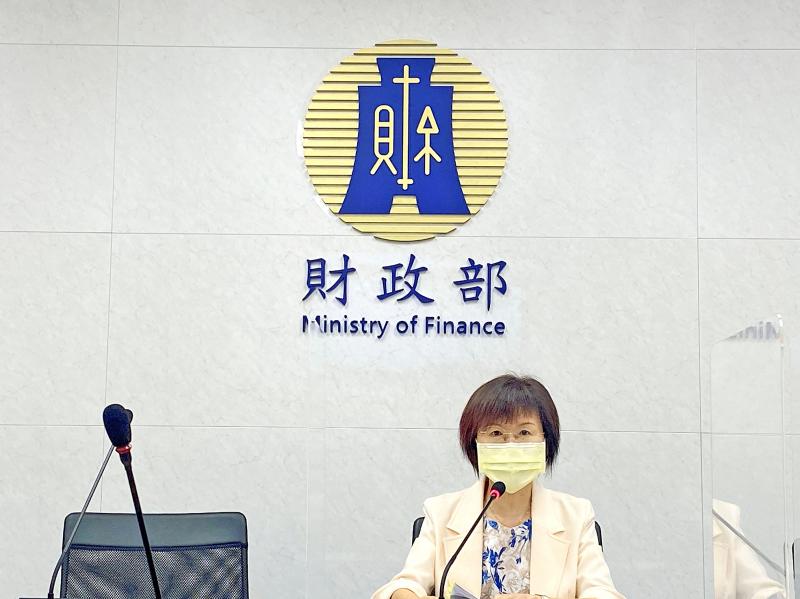Exports last month surged 26.9 percent to a record US$39.55 billion, propelled by robust across-the-board demand, the Ministry of Finance said yesterday.
Demand for tech and non-tech products gained steam as the world emerges from the shadow of the COVID-19 pandemic, a trend that is benefiting Taiwanese exporters, Department of Statistics Director-General Beatrice Tsai (蔡美娜) said.
“The fourth quarter might see monthly export value surpass the US$40 billion mark for the first time, as demand shows no signs of subsiding,” Tsai told a news conference in Taipei.

Photo: Clare Cheng, Taipei Times
Exports this month are projected to grow by 23 to 27 percent, despite fewer working days due to the Mid-Autumn Festival, which falls on Sept. 21 this year, she said.
Shipments of electronic components spiked 21.9 percent year-on-year to a new high of US$15.22 billion last month, thanks to inventory restocking ahead of new product launches by global technology brands, the ministry said.
Exports of information and communication technology products increased 17.5 percent to US$5.3 billion last month, while optical devices picked up 11 percent to US$1.23 billion, it said.
Non-tech products registered faster gains, thanks partly to low comparison bases in the same month last year, it said.
Shipments of mineral products more than doubled from a year earlier, while chemical products soared 61.3 percent, base metal and related products swelled 50 percent, and plastic products surged 42.7 percent, the ministry said.
International raw material price hikes bode well for those non-tech products, aided by major economies pouring funds into infrastructure enhancement projects as the pandemic is brought under relative control, it said.
Imports last month accelerated 46.3 percent to a record US$36.08 billion, giving Taiwan a trade surplus of US$3.48 billion, down 46.5 percent from a year earlier, the ministry said.
Imports of capital equipment soared 63.5 percent as Taiwanese firms aggressively expanded their capacity to meet demand ahead, it said.
Semiconductor equipment, in particular, soared 80.4 percent year-on-year to US$3.44 billion, the ministry said.
Imports of agricultural and industrial raw materials spiked 51.3 percent to U$25.12 billion, while imports of luxury items gained 3.1 percent to US$3.61 billion, it said.
For the first eight months of this year, exports grew 30.9 percent year-on-year to US$284.42 billion, while imports picked up 32.5 percent to US243.21 billion, the ministry said.
It might become a new normal for Taiwan’s monthly export value to be consistently above the US$30 billion mark, Tsai said.

DAREDEVIL: Honnold said it had always been a dream of his to climb Taipei 101, while a Netflix producer said the skyscraper was ‘a real icon of this country’ US climber Alex Honnold yesterday took on Taiwan’s tallest building, becoming the first person to scale Taipei 101 without a rope, harness or safety net. Hundreds of spectators gathered at the base of the 101-story skyscraper to watch Honnold, 40, embark on his daredevil feat, which was also broadcast live on Netflix. Dressed in a red T-shirt and yellow custom-made climbing shoes, Honnold swiftly moved up the southeast face of the glass and steel building. At one point, he stepped onto a platform midway up to wave down at fans and onlookers who were taking photos. People watching from inside

A Vietnamese migrant worker yesterday won NT$12 million (US$379,627) on a Lunar New Year scratch card in Kaohsiung as part of Taiwan Lottery Co’s (台灣彩券) “NT$12 Million Grand Fortune” (1200萬大吉利) game. The man was the first top-prize winner of the new game launched on Jan. 6 to mark the Lunar New Year. Three Vietnamese migrant workers visited a Taiwan Lottery shop on Xinyue Street in Kaohsiung’s Gangshan District (崗山), a store representative said. The player bought multiple tickets and, after winning nothing, held the final lottery ticket in one hand and rubbed the store’s statue of the Maitreya Buddha’s belly with the other,

‘NATO-PLUS’: ‘Our strategic partners in the Indo-Pacific are facing increasing aggression by the Chinese Communist Party,’ US Representative Rob Wittman said The US House of Representatives on Monday released its version of the Consolidated Appropriations Act, which includes US$1.15 billion to support security cooperation with Taiwan. The omnibus act, covering US$1.2 trillion of spending, allocates US$1 billion for the Taiwan Security Cooperation Initiative, as well as US$150 million for the replacement of defense articles and reimbursement of defense services provided to Taiwan. The fund allocations were based on the US National Defense Authorization Act for fiscal 2026 that was passed by the US Congress last month and authorized up to US$1 billion to the US Defense Security Cooperation Agency in support of the

HIGH-TECH DEAL: Chipmakers that expand in the US would be able to import up to 2.5 times their new capacity with no extra tariffs during an approved construction period Taiwan aims to build a “democratic” high-tech supply chain with the US and form a strategic artificial intelligence (AI) partnership under the new tariffs deal it sealed with Washington last week, Taipei’s top negotiator in the talks said yesterday. US President Donald Trump has pushed Taiwan, a major producer of semiconductors which runs a large trade surplus with the US, to invest more in the US, specifically in chips that power AI. Under the terms of the long-negotiated deal, chipmakers such as Taiwan Semiconductor Manufacturing Co (TSMC, 台積電) that expand US production would incur a lower tariff on semiconductors or related manufacturing